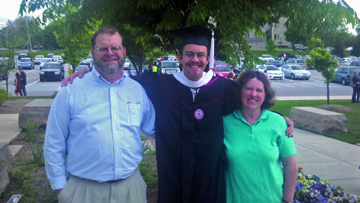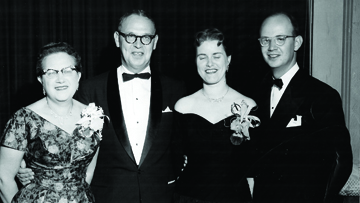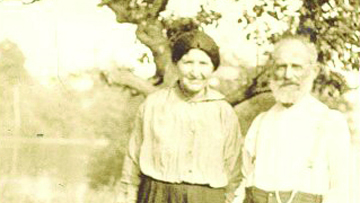You have free articles remaining this month.
Subscribe to the RP Witness for full access to new articles and the complete archives.
Tracing my family’s history for the last century and more, I was struck how Providence worked through seemingly chance things to bring a Christian minister out of an orthodox Jewish family.
In 1890, Zeydeh and Bubbe Pokrass, my great-grandfather and great-grandmother, were living in Zlatopol in Ukraine, part of the Russian Empire, with six of their eight children. Zeydeh was honored in his local congregation for being a Levite. However, life was becoming intolerable for Jews. Zeydeh, with hard work, saved some money from his grocery cart business to get his family out of Zlatopol to England in 1893. There, members of the family met Rudolf Rocker. Rudolf was already making a name for himself as a friend of Jews and as an outspoken Anarchist. He convinced many in the family to abandon practicing Judaism, for the future was in the hands of Anarchy and the working class. Many were shaken in their commitment to the old faith and abandoned it, practically speaking. This had deep effects in the next generation! After some years, they decided it was time to go to farther shores. Most of the family emigrated to America by 1907, ending up in Towanda, Pa.
Son Harry went off to the University of Cincinnati in 1916. There he matriculated as Harry Pokrass and got involved in a lot of on- and off-campus activities. Perhaps he felt a hint of religious stirring, for he was involved in the Menorah Society for a time. The Great War had begun in Europe by 1915, and America came into it in April 1917, during Harry’s first year of college. He enlisted in the Student Army Training Corps, which took college boys and trained them to be military officers. He changed his name from Pokrass to Pockras. It didn’t look so Jewish, and it was hard for Jews to get promoted in the army. To make it look a little more convincing, he listed his religion as Unitarian. He graduated in 1921. The family line was weaning away from Judaism.
After a pretty successful college career, Harry continued with the army, in the Corps of Engineers. In 1924, he married my grandmother, Susanne (Sue) Elias. They had a Jewish wedding in Towanda in 1924. Work for the army eventually took them to Louisville, Ky., where their only child, my dad, Laurence (Larry) Malvin, was born. After several more moves, they ended up in Huntington, W. Va., where Harry spent the rest of his professional life, except for overseas service in the Philippines during the Second Great War. Huntington was the place my dad considered home.
In Huntington, Harry and Sue thought it necessary to obscure their Jewishness even further. They had churchgoing friends in the neighborhood, so they sent Larry to Sabbath school and church with them. Harry and Sue even showed up at the church at Christmas and Easter to enhance the charade. The church was the First Presbyterian Church of Huntington, a congregation of the Presbyterian Church in the United States, still fairly conservative at the time. There Dad heard the gospel. Seeds of faith were sown that would later sprout.
Larry met my mother, Sarah Curtis, when they were in high school. It was love at first sight for Larry. Both went to Marshall College in Huntington; then Larry transferred to the University of Cincinnati for his degree in civil engineering. He sometimes attended Immanuel Presbyterian Church near the university campus. Meanwhile, Mother, from a very nominal Methodist family, studied Reform Judaism just in case she’d have to convert.
Just before Mother graduated from Marshall, and while Dad had a year to go at Cincinnati, they married. After graduating in 1950, Dad worked his first job in Gary, Ind. The job was a major disappointment. However, a Christian friend of his father was the principal of a consulting engineering and architectural practice in Cincinnati. That got Dad’s foot in the door, and back to Cincinnati. Dad and Mother started going again to Immanuel Presbyterian. And they came to know the One we call Jesus. They were baptized in 1953.
I, their firstborn, came along in June 1954 and was baptized at Immanuel in August. By the time I was 14, I had been feeling a growing sense of guilt for sin and prayed nightly that I might be forgiven. But I knew no forgiveness! After over a year in holy Scripture, under much teaching, prayer, and a contest from Dad’s firm that sent kids to a place in New York called Word of Life Island, I understood why Messiah had come, and what He had done to rescue sinners. I came to know Jesus in 1969, on the same night the first man walked on the moon. Now I’m a minister in the Reformed Presbyterian Church of North America. Also, several other great-grandchildren now profess faith in Jesus as G-d’s Messiah, the hope of Israel and the light to the Gentiles.
I like a lot about Jewish culture. And I like the food. But all Tanach (the Bible), all tabernacle and temple, the work of the priests and our fellow Levites, all the holy days, and a goodly proportion of the Law all pointed to Moshiach—to Who He would be and what He would do. He became the Pesach (Passover) Lamb, His blood being shed that the wrath of G-d would pass over everyone trusting in Him. He is the firstfruits from the dead, to which Shavuot (Pentecost) points. He is the shelter from the burning wrath of G-d to which Succoth (Feast of Booths) refers. He became the priest after the order of Melchizedek, of whom Psalm 110 speaks, and His life was shed as the goat of atonement. He is the Son spoken of in Psalm 2 whom nations must kiss, for He is Israel’s king; and He is king over hagGoyim, the nations. He is the prophet of whom Mosheh prophesied in Deuteronomy 18:15 and following.
He is so clearly portrayed—Who He is and what He does—in Isaiah 53, which my great-grandparents may have never read. When they went to shul, it would not be read, for it’s too clear, way too clear, concerning who Moshiach is. It’s so clear that another Reformed Presbyterian minister, my dear friend Richard, was converted from Judaism to Christianity by hearing it. He left his old life behind and lives now for Jesus in Ottawa, Ont.
As far as I know, my great-grandparents never came to Jesus. Nor did their son and daughter-in-law, my Papaw and Mamaw. Their dabbling with Christianity was seemingly only a sham to allow Army promotion, enabling Papaw to rise to full colonel. But I fear they lost their souls!
How sad that makes me. And how it makes me yearn to see the good news, the gospel, presented to the Jews. That gospel is that Moshiach Jesus has come to save sinners, even the worst, Jew and Gentile. I see promises in our New Testament, in Paul’s letter to the Romans, chapter 11, that the Jews will be grafted back into the one people of God. So I pen this in hope that I and others will see the need to do as Paul, formerly Rabbi Saul of Tarsus, did—to take the gospel first to the Jew and then the Greek.
Author Phil Pockras is pastor of Belle Center, Ohio, RPC.


